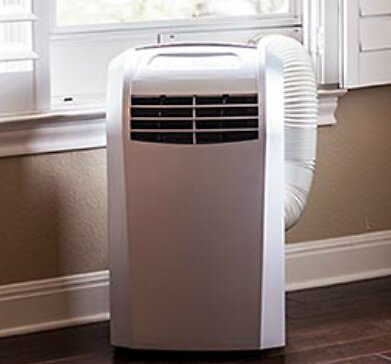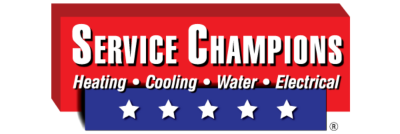Reasons Why Portable ACs Are a Bad Deal

May 6, 2024
A small apartment AC unit may seem like a great way to cool your home during the next California heat wave, but installing something a little more permanent may be a better idea.
Stand-up ACs are good for small, enclosed spaces, but for more substantial areas, a central air duct system or a ductless mini-split can save you money and last longer with fewer repairs. The following are some of the disadvantages of portable air conditioners.
1. Inefficiency & high energy bills
An AC's effectiveness is measured by a unit called the Energy Efficiency Ratio (EER) or the Seasonal Energy Efficiency Ratio (SEER). A portable unit has a much lower rating than an in-home system, meaning it uses more energy. It cools your home less efficiently, so you run the unit longer on a higher setting.
2. Noise pollution
The average central air conditioner’s sound levels usually run at 40 to 60 decibels (dB). Portable units can be loud, with the majority ranging above 58 db and sometimes as high as 70 dB. This isn’t an unsafe noise level, but it can make regular conversation difficult and affect quality of life.
3. Water drainage hassle
A portable AC requires running a drainage line out of the back. It produces water due to condensation, which is part of the cooling process inside the unit. Many AC units drain out a window, while others have a drain pan that needs to be emptied regularly.
4. Limited placement & venting issues
Portable AC units produce heat, so they need somewhere to vent the hot air outside, limiting the options for where to place them in your home. This is not only a home decor dilemma, but it can also block lighting in your home. Depending on the unit, you may need to make alterations to your windows.
5. Short lifespan & higher maintenance
One of the biggest disadvantages of portable air conditioner units is that they don’t last as long as their counterparts and may need repairs and maintenance as they age.
6. Not a true long-term solution
Portable stand-up AC units are less sturdy and break down sooner than a built-in air conditioner. When compared to a standard, well-maintained central air or ductless mini-split system, it may last only half as long.
7. Difficulty cooling large or open spaces
Small stand-alone AC units often aren’t powerful enough to cool bigger rooms or homes with open floor plans. They may start “short cycling” or turn on at full blast, cooling the air directly around the thermostat and then shutting off before the entire room is cooled.
8. Potential for mold and mildew growth
The interior of an air conditioner is moist and dark, making it a common site for mold and mildew growth. Dust and organic matter can build up on the filters if they aren't cleaned regularly.
9. Limited functionality
A full HVAC system or heat pump gives you the option to switch between hot and cold air, while small apartment AC units only blow cold.
10. Potential safety hazards
Stand-alone AC units can cause serious tripping hazards in the home due to the hoses and cords needed to run to drainage sites and power sources. They can also cause a security concern, as you may need to leave your window open for venting.
Alternatives to Consider
Below are some alternative options to portable air conditioning units that Service Champions may recommend instead.
1. Central air conditioning
Your home needs ductwork to install a central AC unit. If your home doesn’t have the right setup, you can have it installed. Depending on your home and budget, this option may be cost-prohibitive.
2. Ductless mini-splIt systems
Ductless AC units are a good option for homes without ductwork. They have two sections, one indoors and one outside, and are usually mounted to the wall out of the way. Tubing and wiring are fed through a small hole to the outside.
3. Upgraded window AC units
Newer, upgraded air conditioning models are quieter and have a lower profile than older units. They’re typically more powerful and better able to cool a larger space. If you’re unsure what kind of AC may work best for you, call Service Champions and talk to an expert.
Frequently Asked Questions About Portable Air Conditioners
How often do I need to drain the water tank on a portable AC? What if I forget?
Depending on the size and type of air conditioner, you may need to drain the tank between once a day and once a week. Check the tank often if it doesn’t have an alarm or indicator light to tell you to empty it. If you forget to empty the tank, the unit may flood your home, a safety hazard that can cause mold or damage if left too long.
How long do portable AC units typically last?
A typical portable AC lasts 5 to 10 years, depending on its usage and maintenance. This may make it a good short-term solution, but installing a more permanent air conditioner is a better option for dealing with those scorching 95-degree California summer temperatures.
If I'm looking for a long-term cooling solution, is a portable AC a good investment?
Portable ACs often don’t meet a household’s needs, so a better alternative would be upgrading your system to a ductless mini-split, heat pump, or residential whole-home unit. Service Champions offers various types of HVAC units and can help you choose the right fit for your home.
Can an HVAC expert help me assess my cooling needs and suggest the best solution for my home?
The best way to assess your home’s cooling needs is to talk to an expert. Service Champions can do it all for you, from checking indoor air quality to helping you choose the right type of air conditioner to install. Our company provides the highest quality HVAC service, using advanced techniques to diagnose problems and assess your home's cooling needs.
Call Service Champions For All Your HVAC Needs
Contact us today to schedule a service call, learn more about your air conditioning options, or talk to a customer service rep about AC repairs and installation. Use the live chat feature on our website, schedule a visit through our online portal, or call 833-600-0991.
We’re the top HVAC installation company in Northern California and are here to keep you cool through the hot summers. We offer accurate estimates, a low price guarantee, and a 2-year client trust guarantee. We can also provide financing options to fit your budget. Your comfort is our top priority.
